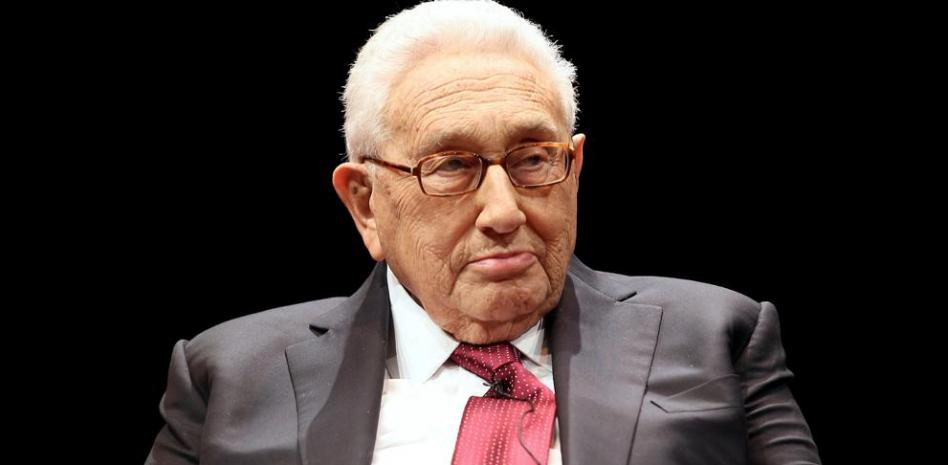I first took notice of the fact that Henry Kissinger is frequently invited to speak before Jewish organizations in 2019. The Jewish Leadership Conference, a politically conservative entity connected to the Tikvah Fund, held its third annual conference on “Jews and Conservatism,” in New York City in November 2019. The list of speakers included prominent Jewish public figures such as Malcolm Hoenlein, of the Conference of Presidents of American Jewish Organizations, as well as leading Jewish intellectuals such as Commentary editor John Podhoretz, Israeli author Yoram Hazony, Prof. Ruth Wisse, and Rabbi Meir Soloveitchik.
But the seat of honor was given to former Secretary of State Kissinger. He was billed as the “Featured Speaker.” He discussed “great figures of the twentieth-century political arena, including Israeli Prime Minister Golda Meir.” The initial announcement offered the public the chance to “Go behind the scenes when, in 1973, Israel was attacked on Yom Kippur.” I wrote several op-eds about the Jewish Leadership Conference invite at the time.
Now one of the most prominent synagogues in America has decided that Kissinger is the appropriate speaker for its next public event despite his record of brutal pressure on Israel, and having called American Jews “traitorous.” History also records that he urged Nixon not to help Soviet Jewry, and that he slandered Yitzhak Rabin.
The November 3 event at Temple Emanu-El in New York City will feature Kissinger.
When Kissinger first became national security adviser, and then secretary of state, I understand that some American Jews were thrilled at the idea that a Jew could reach those levels of government.
But that was nearly fifty years ago. By now, we have had ample time to review Kissinger’s record. And from a Jewish point of view, that record is appalling.
On the eve of the 1973 Yom Kippur War, Prime Minister Golda Meir became aware that multiple Arab nations were preparing to invade. According to the widely-respected Israeli diplomat Yehuda Avner, in his acclaimed book, The Prime Ministers, U.S. officials (meaning Kissinger) “tied” Golda’s hands, telling her “in no uncertain terms not to fire the first shot.”
Abba Eban, who was then Israel’s foreign minister, confirmed in his autobiography that Chief of Staff David Elazar proposed a pre-emptive strike, but Prime Minister Meir and Defense Minister Moshe Dayan rejected it because “the United States would regard this as provocative.” Kissinger even “warned” Golda “against full-scale mobilization” of Israel’s reserve forces, according to Avner. Kissinger did not want Israel to win a decisive victory because he thought that would make it hard to wring concessions out of the Israelis after the war.
After the start of the war Israel desperately requested an airlift of U.S. arms, but Kissinger stalled the request for an entire brutal week. His strategy was to orchestrate “a limited Egyptian victory,” David Makovsky wrote in the Jerusalem Post in 1993. The secretary of state feared an Israeli victory “would cause Israel to strengthen its resolve not to make any territorial concessions in Sinai.”
“Kissinger opposed giving [Israel] major support that could make its victory too one-sided,” Kissinger biographer Walter Isaacson confirms. Kissinger told Defense Secretary James Schlesinger that “The best result would be if Israel came out a little ahead but got bloodied in the process.” A “little bloodied”? Israel suffered horrific losses amounting to 2,656 dead soldiers.
Avner quotes from a conversation between Kissinger and President Richard Nixon on the ninth day of the war, regarding the request for weapons. “We’ve got to squeeze the Israelis when this is over and the Russians have to know it,” Nixon said. “We’ve got to squeeze them goddamn hard.”
Kissinger replied: “Well, we are going to squeeze them; we are going to start diplomacy in November after the Israeli elections.” And squeeze them he did, pressuring the Israelis to release the encircled Egyptian Third Army.
In 1975, when the new prime minister, Yitzhak Rabin, hesitated to give into Kissinger’s demands for more concessions, the secretary of state orchestrated what Avner calls a “brutal” message from President Gerald Ford to Rabin. The message blamed Rabin for the absence of peace and announced a “reassessment” of America’s policy toward Israel. The “reassessment” consisted of a cut-off of all U.S. weapons shipments.
Prof. Gil Troy, in his book, Moynihan’s Moment, reveals some of the disturbing language Kissinger used regarding Rabin during that period. Kissinger accused Rabin of “bringing the world to the edge of war” and charged that Rabin’s reluctance to make more concessions was “fomenting anti-Semitism.” Kissinger denounced Rabin and his aides as “fools,” “common thugs,” “a sick bunch” and “the world’s worst s—ts.”
But it was in 2010 that we learned just how low Kissinger could sink. That’s when a newly-released White House tape revealed Kissinger advising President Nixon that the persecution of Soviet Jewry “is not an American concern.” Kissinger said: “The emigration of Jews from the Soviet Union is not an objective of American foreign policy. And if they put Jews into gas chambers in the Soviet Union, it is not an American concern.”
Blasting American Jews for trying to link trade and human rights, Kissinger added: “I think that the Jewish community in this country on that issue is behaving unconscionably. It’s behaving traitorously.”
Henry Kissinger’s shameful record regarding Israel and Soviet Jewry should disqualify him from being given a platform by any Jewish institution.
Moshe Phillips is a commentator on Jewish affairs whose writings appear regularly in the American and Israeli press. He was a U.S. delegate to the 38th World Zionist Congress in 2020. His views are his own.









